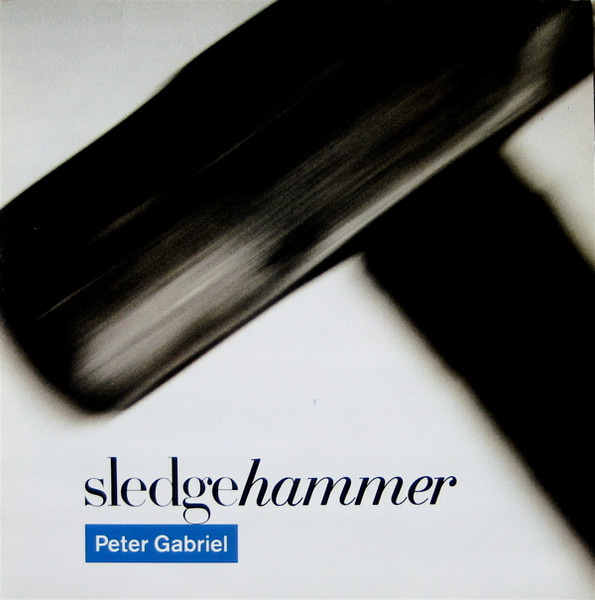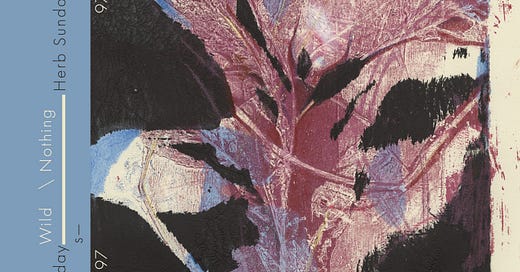Herb Sundays 97: Wild Nothing
Wild Nothing (Jack Tatum) shares his "coffee shop" sophisti-pop selection mixed with new discoveries. Plus some thoughts on the '80s and indie music reaching middle age.
Herb Sundays 97: Wild Nothing (Apple, Spotify, Tidal, Amazon).
Art by Michael Cina. Thanks to Matt Brinkworth.
"As a teenager in the early/mid 2000s I had an affinity for a lot of this kind of "jazz-lite" downtempo and electronic music. I started building this playlist based loosely around those memories but it ended up morphing quite a bit to incorporate some more recent discoveries and other tangents. It's coffee shop music basically, but cuts that I think are really timeless and memorable. I love being able to make deep dives and big name pop tracks sit together in the same room in such a way where you don't really question it." - Jack Tatum (Wild Nothing)
Not much is Herbier than legibility. Jack Tatum’s Indie Rock / Dream Pop project Wild Nothing has a new album Hold (on the Captured Tracks label) which is its fifth and most herbaceous record yet. Check the facts of its maturity and weight: Pandemic-written (check), tunes about parenthood, suburbia, global warming, and workable marital distress (check), expansive production and mixing prowess (check) and it goes on. The album indeed trades in more straightforward lyrical fare, which is distant from Tatum’s earlier thesis, at least how he described it to Pitchfork back in 2012:
I wouldn't say they're all stream of consciousness, but they're not necessarily overwrought. I didn't try and say anything terribly meaningful. I'm definitely not a social commentator at all, so it's partly drawn from personal experience.
But Tatum’s great gift to the world, apart from his bright tunefulness, is his prowess in the studio. The Wild Nothing discography acts as a production journal of Tatum’s musical interests which are on display fully in this week’s Herb Sundays which swings from multi-plat Annie Lennox to Minnenium-era Madonna (a staple in this ‘sletter), to Janet Jackson’s prophetic sibling to “Computer Love”, 1997’s “Empty” in a few easy steps. Wild Nothings’ 2010 breakthrough album Gemini was recorded in his Virginia Tech dorm room (I’ve visited the campus and can KIND OF see it), and its follow-up Nocturne was worked on at Brooklyn’s Rare Book Room which until its sale in 2018 was a stronghold of indie royalty from Deerhunter and The War on Drugs, and each record charts both his influences as well as inventiveness behind the boards.
I’ve come in and out of focus on the project over the years, but have always admired Tatum’s production chops which I was reminded of when I heard his labelmate Molly Burch’s recent song “Physical”, and then thanks to the Herb bible All Music Guide which tipped me that he engineered Japanese Breakfast’s “Be Sweet” which shares this chromatic urge for bigness. Hold turns up the buoyant basslines and lacquered beats, with some Jaco Pastorius noodles mixed in too. Tatum loves the rounded, tubular sounds of ‘80s songcraft and while there are cooler references to bands like The Blue Nile and Japan, it also pulls from the well-remembered ‘80s. It’s there in the album bio which makes sure you know it was mixed by Geoff Swan (Caroline Polachek, Charli XCX) “I wanted to find someone that could help me make this sound as big as possible,” he says. “I've always been very inspired by and attracted to big tent ’80s acts. Peter Gabriel and Kate Bush are two of my biggest influences ever because they clearly never shied away from that kind of ambition.”
And almost like Peter Gabriel’s So (1986), where those two artists finally merge, Tatum employs a tasteful few collaborators on Hold (Jorge Elbrecht, Tommy Davidson of Beach Fossils, and Hatchie’s Harriette Pilbeam). If you are texting buddies with me, you’ll know I talk about the year 1986 with a spiritual bent. Maybe because “Sledgehammer” was one of the first 7” records I remember owning for my brown Fisher-Price Turntable, replete with the blurry Trevor Key/Peter Saville paper sleeve. Even though mainstream media likes to say “The ‘80s are back!” every few years, I never quite take the bait. They may mean a vague sense of late disco aesthetics in a video or hedonistic lyrical fare, but the ‘80s for me was the sound of studied musicianship (sometimes showy, yes), and powerful analog synths and early samplers being literally smashed onto physical tape, the culmination of 3 eras of musical technology with the budgets to match. These things don’t happen all so much, so when someone does an homage like Tatum, I appreciate it.

If in the mood, check the Classic Albums doc on Gabriel’s So and marvel at the ingenuity, where the Fairlight synth meets bone-hard musicianship. Realize that “Sledgehammer” is the last track recorded in the set, right before they pack up the gear, and sense that the pumping heart of the tune is not Gabriel, or Daniel Lanois, but a meditative Manu Katche drum break, like the leafy impression on a found fossil, a beating eulogy to humanity buried beneath the grandeur.
Growing up, Indie.
My 44th birthday was this week, so looking into Wild Nothing’s movement into middle age isn’t lost on me. With more new festivals geared towards nostalgia in all genres, Sonic Youth memoirs abound, Hip-Hop’s 50th, and the like, we’ve officially reached middle age in independent music culture.
Some of the discourse around the most recent Drake album was around whether he is, or should be, writing “age-appropriate” music. Your answer might lie in your beliefs in art and the obligation of artists either as chroniclers of their own growth or as avatars of a certain era. Should they be suspended in time like a Simpsons character or slide up/down the same tree the rest of us do? Speaking of the ‘80s I doubt many Duran Duran (who are still rather active) fans want them to tackle weightier subjects, but I haven’t checked. Jon Caramanica hinted in a podcast at the fact that each new generation gets its own Drake, so maybe it is indeed Aubrey’s job to continue to project youth however he sees fit.
I've come to see aging as the abandonment of potential selves, which carries some melancholy but also a great deal of relief in that you can make the selves you do retain their very best. These moments come in waves through life, either in the "I'll never be a pro athlete/astronaut" phases or the "Am I a gifted academic?" (I imagine the anime butterfly meme with an A- paper in hand) and then the "married with [child/pet] and [posession] by [insert number] years old" and so on. Mile markers come and go on the highway, often even unnoticed until miles beyond, and sometimes they don’t actually exist at all, are perhaps some are just read from bumper stickers for Mystery Spot ideas we saw once. Sometimes we get off at one of these exits and find ourselves right back on, duped into thinking we had it made.
When Ed Droste of Indie gods (of mine and many) Grizzly Bear shared recently that he had become a therapist I was thrilled. To a younger person, it might have read as an admission of failure, a "quitting" of sorts. But to someone my age I was like "Wow that's so cool he found a new career he digs” and was vaguely jealous/intrigued.
In the arts, there’s a stigma against quitting or becoming a civilian again, as if it were the worst thing that could happen to you. In fact, I’m starting to see it as its reverse, that quitting/stopping/reducing/transitioning is deeply underrated. Perhaps the goal of developing an artistic practice in youth is to learn how to live and then apply it to life. The joy of working in the arts either on the creative or business side indeed exacts a heavy toll on one’s psyche in that it preys upon our deepest desires and childhood dreams. For me, that aforementioned ‘80s and ‘90s MTV still takes up a lot of real estate in the glittery Pantheon neighborhood of my mind, without much value to the rest of my work apart from aesthetic intrigue.
The writer/marketer Seth Godin wrote The Dip back in 2007, a useful pop biz/self-help tome that charts the reality that all things (businesses/careers/skills) start and then get easier before they get harder for a long time (the Dip in question) before they get easier again well after. This Dip is usually what weeds people out of certain fields and lanes (i.e. Organic Chemistry for medical students or a couple of coast-to-coast laps in a dirty van for bands). The question is if the dip is worth grinding through and if so, why. A lot of life is spent in devotion to things that no longer drive or serve us. The demons of our upbringing, school years, and the romantic slings and arrows of youth, while imperative to experience, become fossils of identity or things to maybe be exhumed only to be mostly retired, which is maybe what this blog is in fact. The question after that is what do you fill that space with? And maybe you find yourself behind a large automobile again, back on the freeway. Who’s to know?
From the Field
I helmed Ghostly’s Lot Radio spot this week and invited my friend Guillaume who runs the Spring Theory label.
Herb Hero Jeff Weiss’s Passion of the Weiss blog shares a plethora of new mixes including one from Purelink and a nod to the influential mnmlssg (minimal sausages fwiw) blog.







Great post. As a recently turned 45 year-old and father of three, I can definitely relate.
Loved your take on "80s are back" misrememberings. An additional reason "So" is a perfect snapshot of the time it that it seems one of the last successful albums of the Fairlight era. PG would return only in 1992, with the much more somber Us. And by 1987, Bowie's "Never Let Me Down" and Pink Floyd's "Momentary Lapse of Reason" apparently sounded dated right as they were being released.
(IMO, the end of the 80s sound is a topic that could be somehow further explored...)